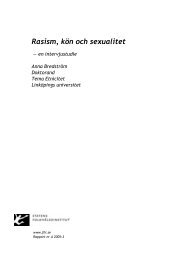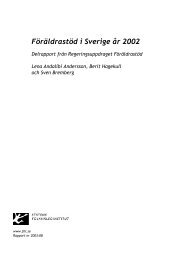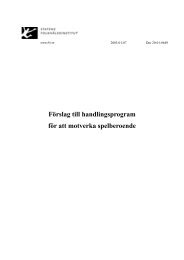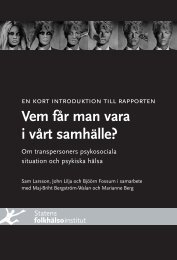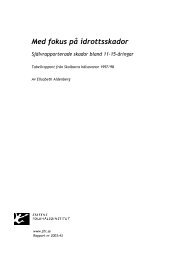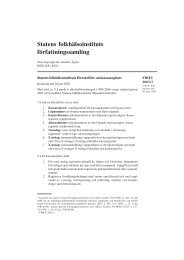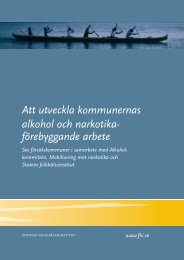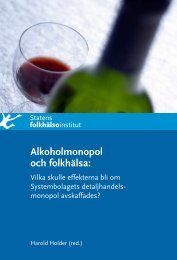Gambling motivation and involvement: A review of social
Gambling motivation and involvement: A review of social
Gambling motivation and involvement: A review of social
You also want an ePaper? Increase the reach of your titles
YUMPU automatically turns print PDFs into web optimized ePapers that Google loves.
Extensive summary<br />
thiS REpORt pRESEntS a <strong>review</strong> <strong>of</strong> <strong>social</strong> science research on gambling. The objective<br />
is to sum up what the literature says about the motives people have for gambling<br />
<strong>and</strong> the factors that influence their degree <strong>of</strong> <strong>involvement</strong> in gambling. The report<br />
is commissioned by the Swedish National Institute <strong>of</strong> Public Health <strong>and</strong> is part <strong>of</strong><br />
the preparations to the data collection phase <strong>of</strong> the Swedish Longitudinal <strong>Gambling</strong><br />
Study (SWELOGS). Most <strong>of</strong> the previous gambling research relies on medical<br />
concepts <strong>of</strong> problem gambling as pathology. This <strong>review</strong> focuses on the <strong>social</strong>,<br />
economic <strong>and</strong> cultural aspects <strong>of</strong> gambling rather than perceiving it as a progressive<br />
<strong>and</strong> irreversible disease in an individual. 434 works are cited in this report. Predominantly<br />
biological, psychiatric <strong>and</strong> psychological research on gambling, including<br />
problem gambling prevalence studies, which have been excluded from the <strong>review</strong>.<br />
Directly related to the description <strong>of</strong> each research approach, conclusions on the<br />
usefulness for gambling research can be found.<br />
The section on sociological approaches on gambling research deals with structural<br />
functionalism, <strong>social</strong> frustration <strong>and</strong> escape theories, gambling as <strong>social</strong> rewards,<br />
subculture studies <strong>and</strong> geographical analyses. From the perspective <strong>of</strong> structural<br />
functionalism gambling is regarded as a mechanism which can help reduce tension<br />
in society. By keeping hopes for betterment alive, gambling can reduce some <strong>of</strong> the<br />
frustration among segments <strong>of</strong> the population <strong>and</strong> avoid conflict. It is uncontroversial<br />
to claim that people gamble to escape from everyday life. Social frustration <strong>and</strong><br />
escape theory can however also shred light on what factors that push the gambler<br />
away from ordinary life <strong>and</strong> pull him or her towards gambling. From the perspective<br />
<strong>of</strong> <strong>social</strong> rewards gambling can be regarded as a <strong>social</strong> contest, but also as<br />
something that relates to togetherness <strong>and</strong> conviviality.<br />
Subculture studies perceive gambling environments as subcultures with specific <strong>and</strong><br />
complex cultural codes. It is concluded that very high gambling <strong>involvement</strong>, resulting<br />
in huge monetary losses <strong>and</strong> personal problems, can be explained by <strong>social</strong> factors<br />
rather than individual pathology. Within geographical analyses the relations between<br />
the availability <strong>of</strong> gambling <strong>and</strong> socio-economic variables in geographical space are<br />
investigated. Research from New Zeal<strong>and</strong> <strong>and</strong> US has shown that gambling opportunities<br />
are more common in deprived areas <strong>and</strong> that people living in a neighbourhood<br />
close to a gambling venue had a significantly higher risk <strong>of</strong> having gambling problems.<br />
The section on economic approaches on gambling research deals with a wide<br />
range <strong>of</strong> different perspectives, beginning with a mathematical paradox related to<br />
coin tossing in 1728, ending with modern economic theories on betting markets<br />
with parallels to financial markets. The question <strong>of</strong> why rational people chose to<br />
gamble remained unsolved in economics for more than 200 years. In 1948 Milton<br />
Friedman <strong>and</strong> Leonard Savage came up with a widely accepted solution, relying<br />
6 G A M B L I N G M O T I VAT I O N A N D I N V O LV E M E N T




